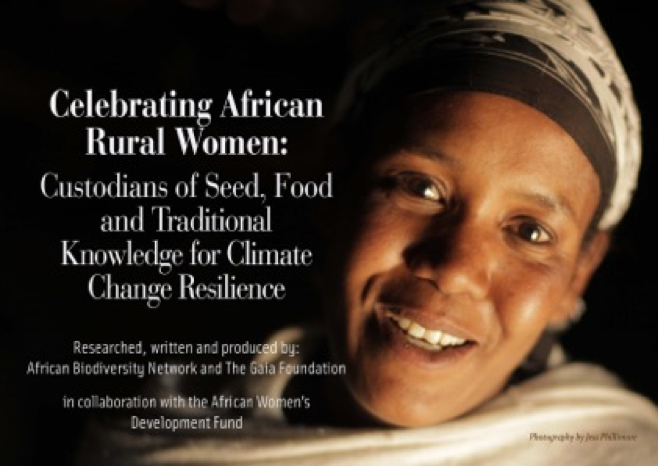Celebrating African Rural Women: Custodians of Seed, Food & Traditional Knowledge for Climate Change Resilience – a new report by The Gaia Foundation, African Biodiversity Network, and African Women’s Development Fund
By: Fiona Wilton (CEESP member)
At a time when Africa most needs it, the vast wealth of farmer’s knowledge that sustains the diversity of the continent’s crops, wild foods, nutrition, medicinal plants and Africa’s resilience to climate change is on the verge of being lost forever. In their pursuit of profit, big agribusiness and governments are aggressively expanding fossil fuel-intensive monocultures and introducing laws which criminalise saving and exchanging seed, thereby riding rough-shod over those who are most knowledgeable about and able to safeguard agro-biodiversity. Dr. Melaku Worede from Ethiopia, responsible for establishing the first gene bank for seeds and plant materials in Africa, and pioneering to put seed back in the hands of farmers, explains “The rich genetic diversity that we see across the planet didn’t just occur by chance. Farmers have played a key role in creating and maintaining this diversity by domesticating and breeding plants to adapt to the conditions under which they were farming… with a multitude of characteristics and criteria to meet the needs of the family and the community. It is the women who carry out most of the seed selecting, breeding, storing and protecting. They look for specific characteristics of interest, such as how it will cook, how it tastes, its storability and colour.”

Photo: Fiona Wilton
Celebrating African Rural Women: Custodians of Seed, Food and Traditional Knowledge for Climate Change Resilience shows how small farmers – mainly women - still produce 80% of the food in Africa on just 14.7% of the agricultural land[1], and control 80% of the seeds produced and exchanged on small farms[2]. It offers a window into the complexity of women’s agricultural knowledge, and their understanding of the nutritional and cultural needs of the family and the community – all of which lie at the heart of food sovereignty.
The report celebrates the vital role that African rural women play in selecting, breeding and enhancing the diversity of their seeds. Kagole Margret Byarufu, from Hoima in Uganda, explains “By learning from the elders we re-discovered exciting things like a type of pumpkin which is as big as a watermelon, but white inside. It grows well when it is dry, cooks well, and you can feed the cows with the outer skin. We have also re-learnt how to mix many different seeds together when planting. Traditionally elders would mix millet and green grams, pumpkin calabash seeds and castor oil as each plays a different role. The different crops use different nutrients from the soil. So they help each other and whatever the weather, something will grow.”
The report captures the voices of women who are actively working with their local communities, reviving seed diversity, and regaining their leadership role - from Ethiopia, Kenya, South Africa, Uganda and Benin. As custodians of encyclopaedic agricultural knowledge, they are both disproportionately affected by the expansion of the industrial model of agriculture and leading the counter movement to ensure that Africa’s food future is diverse and helps cool the planet.
Celebrating African Rural Women: Custodians of Seed, Food and Traditional Knowledge for Climate Change Resilience (French version coming shortly) can be downloaded from: http://www.gaiafoundation.org/CelebratingAfricanRuralWomen
http://africanbiodiversity.org/1046-2/
[1] GRAIN (2014), Hungry for Land (Barcelona: GRAIN). Available at: https://www.grain.org/
article/entries/4929-hungry-for-land-small-farmers-feed-the-world-with-less-than-a-quarter-of-all-farmland
[2] Altieri, M.A. (2008), Small Farms as a Planetary Ecological Asset: Five Key Reasons Why
We Should Support the Revitalisation of Small Farms in the Global South (Penang: Third World Network), p.6. Available at: http://www.twnside.org.sg/title/end/pdf/end07.pdf
